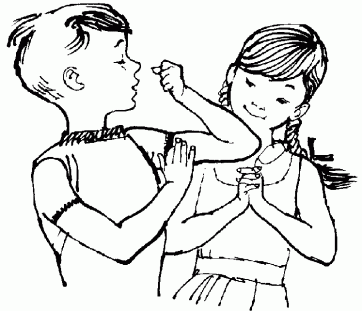Be a “real” man

A boy shows off his masculinity.
“Femininity is depicted as weakness, the sapping of strength, yet masculinity is so fragile that apparently even the slightest brush with the feminine destroys it.”
-Gwen Sharp
“William wanted a doll. He wanted to take care of it like he was its father. ‘Don’t be a creep,’ says his brother. ‘Sissy, sissy, sissy,’ chants the boy next door.”
Masculinity is everywhere. Males are usually identified by their confidence, strength, and facial hair. Masculinity is guided by power, (heterosexual) sex and money. When these features are not as strong, somehow, a man seems, well, less of a man.
“Physically, a man has only virile features, strong build, muscles, beard, etc. If a man has any feminine features, he will most likely be criticized,” Shridhar Athinarayanan (9) said.
This idea of a man that we have created is so singular, specific and solid that it limits the individuality of many men. They are expected to live up to this certain image. When it is not achieved, they are mocked by both men and women. This causes masculinity to be fragile, forbidding common human actions like showing emotions.
“Men are expected to be logical thinkers who excel in STEM subjects. If they cry, show compassion or otherwise express emotion, society calls them weak and feminine,” Tara Sandlin (9) said. “These characteristics certainly do not fit the stereotype of the macho, straight male who embodies masculinity, so people assume that showing emotion indicates homosexuality.”
So does this mean women and femininity are weaker? No. It just means that we need to eliminate the stereotype associated with masculinity.
“Something I abhor is the mentality that fathers aren’t allowed to cry in front of their sons. Men should be able to express emotions just like others can. Everyone has emotions and it’s not just if a particular group of people must suppress them to seek validation from society,” Athinarayanan said.
Phrases like “be a real man,” “boys don’t cry, ” and “real men don’t…” hinder men. While women still live with some oppressive gender roles, so do men. Men are expected to earn the money, while women stay at home; these roles have developed, but they stay true to an extent. Why is masculinity so fragile to where some men feel insecure if a woman earns more than him?
Men are supposed to “wear the pants in the house,” right?
“This phrase [wear the pants in the house] is used to recognize who is the authority figure in a household and usually this authority figure claims dominance because they provide for the family. Men are expected to have this title. Essentially, this phrase works as a way to determine one’s strength and work abilities, but it often overlooks people,” Athinarayanan said.
Why are men expected to pay for dates and almost everything else?
“Back in the day when women didn’t work or were limited to careers with extremely low salaries, it made sense for men to pay. Now, women sometimes make more money than men, yet men are still expected to pay all the time.,” Sandlin said.
Specific items are obviously marketed towards specific genders. Barbie dolls for girls, action figures for boys. Bath bombs for women, bath grenades for men.
“I think that both boys and girls can enjoy many different types of toys. Girls can play basketball, boys can jump rope. Boys can enjoy dolls and girls can enjoy spaceships. Instead of marketing toys based on a child’s gender, companies should market toys based on a child’s interests,” Sandlin said.
Such expectations cause for such marketing and gender “differences.” These expectations cause men to hold such images to prove their masculinity to others, allowing for masculinity to be extremely fragile.
Your donation will support the student journalists of White Station High School. Your contribution will allow us to purchase equipment and cover our annual website hosting costs.


































